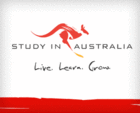Australia
Universities in australia
• ACADEMIES AUSTRALIA GROUP OF COLLEGE
• EDUCATION CITY-QUEENSLAND
• AUSTRALIAN INSTITUTE OF COMMERCE & LANGUAGE
• BEDFORD COLLEGE
• AUSTECH INSTITUTE FOR FURTHER EDUCATION
• UNIVERSITY OF WESTERN SYDNEY
• ACADEMIA INTERNATIONAL
• AUSTRALIAN ACADEMY OF HAIR DRESSING
• IMAGINE EDUCATIN ASTRALIA PVT. LTD.
• THE INSTITUTE OF TAFE TASMANIA
• UNIVERSITY OF TASMANIA
• STOTT’S COLLEGE – MELBOURNE
• PERTH COLLEGE – PERTH
• CENTRAL QUEENSLAND UNIVERSITY
• AG MATE ACADEMY, SYDNEY
• INTERNATIONAL COLLEGE OF CREATIVE ARTS, VICTORIA
• PECIFIC GATEWAY INTERNATIONAL COLLEGE
• SUNRAYSIA INSTITUTE OF TECHNICAL AND FURTHER EDUCATION
• YORK INSTITUTE
Cost of Living
An Australian Government survey showed that in terms of total costs-including tuition fees and living expenses-Australia was consistently less expensive than the USA and UK. Tuition fees will vary contingent on the course or institution. This website provides average costs as a guide. Living costs too will vary by location, course and lifestyle.
Australia offers excellent value for money, with living expenses and tuition costs in Australia considerably less expensive than the United Kingdom (UK) and the United States of America (USA)
Tuition fees vary according to the institution and course selected but this website provides a guide to the average costs. Scholarships are available for international students but the competition is intense and most of the international students in Australia are full-fee paying students
The average international student in Australia spends about $320 per week on housing, food, clothing, entertainment, transport, international and domestic travel, telephone and incidental costs. This is a realistic guide, but remember that individual circumstances will vary by location, course and lifestyle
International students studying in Australia are required to have Overseas Student Health Cover (OSHC) for the duration of your student visa in Australia. Students in Australia are also responsible for their own accident and property insurance. It is a good idea to take out travel insurance before leaving your country to cover lost baggage, cancellation of plane tickets and repatriation
International students can work while studying in Australia but the money you earn should not be used as your only source of income. To be granted a student visa in Australia you need to have adequate means of financial support
Tuition Fees
International students are charged up-front tuition fees. Institutions sometimes make an additional charge to cover other costs associated with being a student: student organisation membership, library and laboratory costs and sports facility costs. Some courses make specific charges for excursions, books, stationery and other essential material. These costs will vary depending on the course or institution therefore average costs are provided below and should only be used as a guide. All school tuition fees are exempt from Australia’s Goods and Services Tax (GST).
Institutions will advise when to pay your tuition fees and acceptable methods of payment.
University Foundation Studies $A9000-$A14,000 a year Approx.
such as university entrance, preparatory and bridging courses
Undergraduate
Bachelor Degree $A10,000- $A13,500 a year Approx.
such as courses in arts, business, economics and law
Laboratory-based Bachelor Degree $A11,000- $A16,500 a year Apporx.
such as science and engineering courses
Postgraduate
Graduate Certificates
Graduate Diplomas $A9000- $A16,000 a year Approx.
Masters
Doctoral Degree $A11,000-$A18,500 a year Approx
About Australia
Australia is the largest island and the smallest continent in the world. It lies between the Indian Ocean and the South Pacific Ocean. It is about 11,000 kilometres southwest of North America and 3,200 kilometres southeast of mainland Asia.
Australia boasts a fantastic temperate climate. It is a land of bright sunshine, surf beaches, tropical rivers, rainforests, mountain ranges, red deserts and rich green coastal plains. The flora and fauna are interesting and unique, with kangaroos, koalas and wombats included in the array of wildlife.
The population of Australia is almost nineteen million. More than four-fifths of the people live in cities and towns that are generally in coastal areas near the mouth of a river and as close as possible to a good ocean harbour. The main cities are Sydney, Melbourne, Brisbane, Perth, Adelaide, Hobart and Canberra and are all State Capital cities.
Most Australians enjoy an excellent standard of living, good educational opportunities and a relaxed lifestyle made possible by the outstanding natural and economic features of the country.
There are a range of climate types with the north being tropical, the centre being desert and the southern coastal areas being temperate. The seasons are the reverse of the Northern Hemisphere. January/February is generally the hottest time of year and the months around July are usually the coldest. In the tropical north it is warm to hot all year around, with the seasons being simply referred to as ‘wet’ or ‘dry’. The majority of the population live around Australia’s coastal edges, due to the harsh environmental conditions of the centre.
Education System
Australia is an internationally recognized source of high quality education as well as research excellence. Our universities, vocational education and training colleges and schools are world-class. Australia world in English language courses for international students. Australian Government legislation requires quality assurance agencies and codes of conduct to be in place so that international students in Australia and their parents enjoy a level of service and financial protection that is unparalleled. Multicultural Australia is a safe, friendly, sophisticated and harmonious society in which students can learn and travel in an English speaking country. Australia also offers excellent value for money and a high standard of living.
Why Study in Australia?
Australia has the third largest number of international students in the English-speaking world behind the USA and UK. In some countries Australia is the students’ first choice study destination.
Australian qualifications and institutions are recognized worldwide for their high quality and excellence. Graduates from Australia are very successful in finding jobs and hold lead positions worldwide. Also, they are readily accepted for postgraduate study at leading international universities. Living expenses and tuition costs in Australia are considerably less expensive than the UK and USA. Have a look at the interactive map and see where Australia is in relation to the rest of the world. You can also see how close we are to your home country.
Recognition of Australian Qualifications
Australian qualifications are respected globally when seeking employment or further study at leading international universities. Distinguishing Australia from many other countries is the Australian Qualifications Framework (AQF) which is a national system of learning pathways recognised throughout Australia and the world.
Qualifications Recognition
Australian qualifications are recognized globally when seeking employment or further study at leading international universities. Most courses and training undertaken by international students in Australia on a student visa are covered by the Australian Qualifications Framework (AQF). The AQF is a national system of learning pathways which is endorsed by the Australian Government and recognised throughout Australia and the world. On completion of an AQF qualification international students can progress to the next AQF level anywhere in Australia provided they satisfy student visa requirements.
My Country Enrollment Statistic?
More than 180,000 international students from about 80 countries study in Australia each year. You should visit Study in Australia websites for country-specific student statistics.






